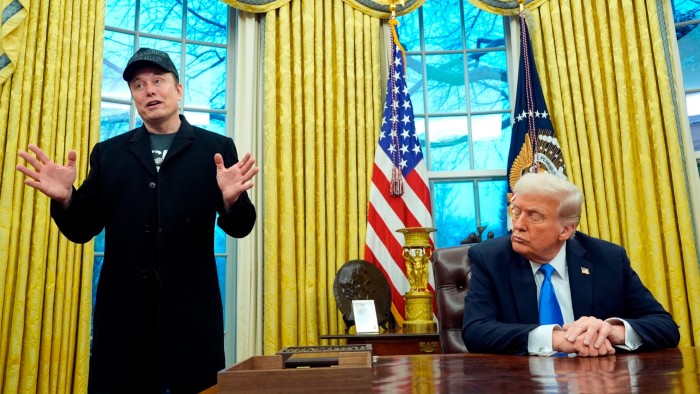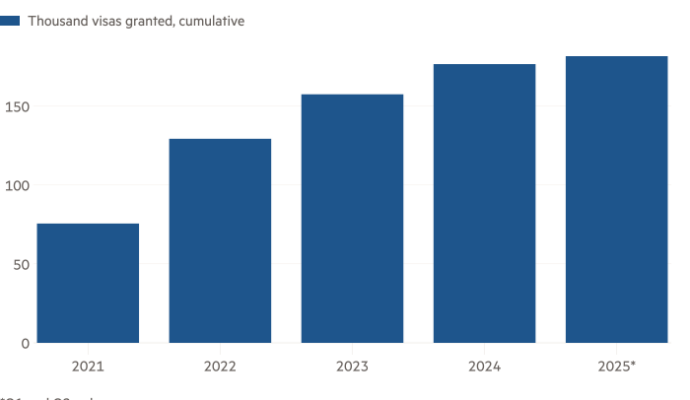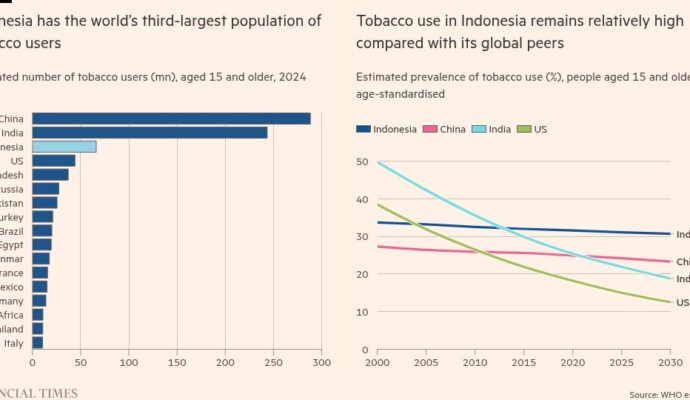
Stay informed with free updates
Simply sign up to the Politics myFT Digest — delivered directly to your inbox.
A person born on the day that Apple released the first iPhone can now vote. After 18 years, we might expect the newest version — which came out last month — to be unrecognisable from the original. Whatever the cumulative improvements, it isn’t. But then a car made that year wouldn’t seem out of place on today’s roads either. Also, look at images of Nicolas Sarkozy’s election as president of France and then images of his ride to prison this week. Aside from the greying of the man himself, can you tell the two eras apart? Not as quickly, I wager, as you could distinguish 1989 from 2007, which is the equivalent jump in time.
Now, let us run that comparison again, but this time track political rather than technological change. When the iPhone debuted, there was relative peace in the world, a strong centre ground in almost all western democracies, an entwined US and China and a pro-trade consensus. Now, there is a European land war of primordial viciousness, the hard right are in or near national office across the west, US-China relations veer from tense to hostile and David Ricardo is in the dog house.
Public life, not private innovation, has supplied the drama of our times. You wouldn’t always know it from the “discourse”.
Perhaps I have attended an excessive number of conferences and dinners this year but I sense that people — even, or especially, clever people — are starting to think too much about tech and too little about politics. The wall-to-wall artificial intelligence conjecture is one thing, but it doesn’t stop there. Jeff Bezos envisages “millions of people living in space” within the “next kind of couple of decades”.
Well, Earthlings, here are some entirely realistic scenarios in politics over a shorter time range. France elects a hard-right president who, without leaving the EU, impedes it from within until it ceases to function. Russia does something to a Nato member state that appears to constitute an “armed attack” under Articles 5 and 6 of the Treaty. The Sahel — where more than half of all terrorism-related deaths on Earth now take place, compared to hardly any in 2007 — becomes a base for attacks on the west. (Think turn-of-the-millennium Afghanistan, but much closer to Europe and America.) Britain or France or both suffer a bond crisis that triggers, at best, a necessary change in economic policy, and at worst civic unrest.
These subjects don’t go undiscussed, of course, but the amount of oxygen they receive compared to tech talk is out of line. As a rule of thumb, be sceptical of any “futurologist” who doesn’t major overwhelmingly on politics.
The grandest visions for AI — huge consumer surplus, huge job losses too — could happen. The departures of Xi Jinping (72) and Vladimir Putin (73) are going to happen, with implications for multitudes even outside their own two countries. The spread of possible outcomes is wide: from a détente between the west and the Eurasian autocracies under a new generation of leaders to an even higher pitch of conflict that is harrowing to think about.
So, by all means, speculate about the potential of tech. But understand that one or two completely plausible political developments would drown out any effect that tech is likely to have on daily life. Even a modest trend, such as Europe’s projected increase in defence spending, has implications for taxes and therefore private consumption that it would take a major innovation to equal or cancel out.
Consider the very recent past. Nothing has affected businesses and consumers since the pandemic as much as the surge of inflation. Whatever you choose to cite as the culprit — the Ukraine war, monetary looseness, lockdown-induced damage to supply chains — it was political. That experience should have reminded us of the primacy of the public realm. Instead, the fascination with technology as the shaper of realities has only increased over the period.
Why? Some of it is a generational habit. In the 18 years before the iPhone, technological change was dizzying: little or no internet to ubiquitous connectivity, boxy and dirty cars to clean if monotonously bulbous ones. Whereas the difference between George HW Bush and George W Bush was less marked. People who came of age in that era — that is, almost everyone of influence today — will tend to emphasise technology over politics as the motor of history. Hence the widespread conviction that social media begot populism. (But somehow not in Australia or Denmark. Funny, that.)
Another reason for the emphasis on tech is that it is a coping mechanism. Technological trends are less scary to ponder than political ones. Better a conversation about deep fakes than about a pan-European war. It is a way of being serious without being really serious.
Look at what people who can do anything choose to do. When Elon Musk and other tech barons stuck their oars into public life, it was read as an attempt at self-dealing: at skewing regulation and even public contracts their way. To some extent, perhaps it was. But don’t doubt their sincerity as individuals who want to leave a mark. Veering into politics was a tacit admission of where the action is. Almost nothing in commerce can equal affairs of state as a source of intellectual stimulation and a means to historical impact. Those who reach the top of tech seem the most clear-sighted about its limits.


